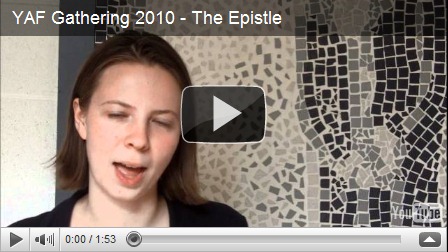Thursday, June 30, 2011
Greetings from Illinois Yearly Meeting by Paul Buckley
Thursday, June 23, 2011
Greetings from IMYM by Rob Pierson
 Greetings from IMYM! IMYM held its 37th Annual Gathering in early June at Ghost Ranch, New Mexico. If you know Georgia O'Keeffe's paintings, you'd recognize Ghost Ranch as her old haunt, with its mesas of ochre, vermilion, yellow and gray rising above the valley cottonwoods. This year smoke sometimes obscured the inspiring vistas – a reminder of raging wildfires to the West, threatening our clerk’s home in the wilderness near the New Mexico / Arizona border.
Greetings from IMYM! IMYM held its 37th Annual Gathering in early June at Ghost Ranch, New Mexico. If you know Georgia O'Keeffe's paintings, you'd recognize Ghost Ranch as her old haunt, with its mesas of ochre, vermilion, yellow and gray rising above the valley cottonwoods. This year smoke sometimes obscured the inspiring vistas – a reminder of raging wildfires to the West, threatening our clerk’s home in the wilderness near the New Mexico / Arizona border. No account of the week at IMYM would be complete without mentioning the ultimate frivolity, the "Intergenerational Exchange of Colors." Picture four or five dozen Friends from tot to elder, all dressed in white (at least to start), some sporting goggles to protect the eyes, and clutching bottles of sprayable dye in vibrant blue, green, pink, yellow and red. What would George and Georgia say? (Fox & O'Keeffe, that is)
No account of the week at IMYM would be complete without mentioning the ultimate frivolity, the "Intergenerational Exchange of Colors." Picture four or five dozen Friends from tot to elder, all dressed in white (at least to start), some sporting goggles to protect the eyes, and clutching bottles of sprayable dye in vibrant blue, green, pink, yellow and red. What would George and Georgia say? (Fox & O'Keeffe, that is) in the relation of science and faith, Quaker readings of the Bible, and
the nature of pilgrimage as a practice of sacred time and sacred place. He
is a systems engineer and clerk of Oversight & Counsel at Albuquerque
Monthly Meeting.
Tuesday, June 21, 2011
Traveling Among Friends by Mac Lemann

Mac Lemann, ESR '07, is the clerk of the Friends Meeting of New Orleans, Board Chair of the New Orleans Food Cooperative, and is renovating property damaged by the failure of the flood-walls after hurricane Katrina.
Friday, June 17, 2011
Travel Interlude
From June 16 to July 3rd, the majority of the ESR faculty will be traveling to Kenya and Rwanda. (I am leaving tomorrow on the 18th.) Please pray for us, our safe travel, and for illuminating experiences for both us and the people we will be visiting. We ask all of our Master of Divinity/Master of Ministry students to take cross-cultural trips that allow them to explore theology in a very different context. We're taking a "dose of our own medicine" (actually, for this trip it's more vaccines . . . lots and lots of vaccines), expanding our own experience of Quakerism, and delving into new cultural contexts!
As you might have noticed, our blog posting has slowed down somewhat as the semester has ended here and this trip will continue that trend. You'll hear from some of our alumni and current students on Yearly Meeting annual sessions while we're gone. When we return we will be sure to share our thoughts and impressions from this trip.
Peace,
Valerie Hurwitz
Tuesday, June 14, 2011
Not the Best, Just Faithful, by Faith Kelley
Thursday, June 9, 2011
Young Adult Friends Gathering Video Series - Service Days
By Micah Bales
This video is the tenth in a series put together from footage and interviews taken during the 2010 Young Adult Friends Gathering in Wichita, Kansas. This gathering took place over the 2010 Memorial Day Weekend and was perhaps the most diverse and balanced YAF gathering in generations. Roughly equal numbers of Liberal-Unprogrammed, Pastoral and Evangelical Friends were in attendance, along with a small number of Conservative Friends.
This video features the service portion of the gathering, which took place after the weekend event. We spent our days doing landscaping for Mennonite Housing in Wichita. Our nights were spent playing games and getting to know each other better. While only about a dozen of us were able to stay for the service days, it was a blessed time that had its own special flavor.
 Micah Bales serves as Coordinator of Young Adult Engagement at ESR. He lives in Washington, DC with his wife, Faith Kelley. He is active with Capitol Hill Friends and is a member of Rockingham Friends Meeting, Ohio Yearly Meeting.
Micah Bales serves as Coordinator of Young Adult Engagement at ESR. He lives in Washington, DC with his wife, Faith Kelley. He is active with Capitol Hill Friends and is a member of Rockingham Friends Meeting, Ohio Yearly Meeting.
Tuesday, June 7, 2011
Native American Quakerism at Great Plains Yearly Meeting
By Micah Bales
Great Plains Yearly Meeting was founded as Nebraska Yearly Meeting in 1908, when it was set off (amicably separated from) Iowa Yearly Meeting. Nebraska Yearly Meeting was established as a member of the 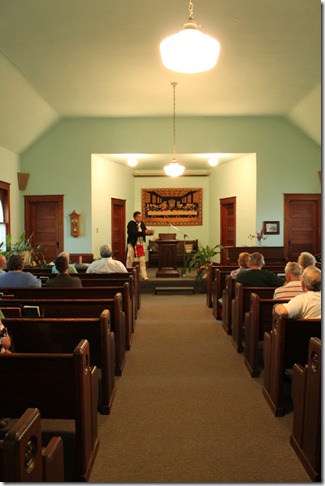 Five Years Meeting (today Friends United Meeting). It was founded as a pastoral, Evangelical-leaning body of Friends on the great American prairie.
Five Years Meeting (today Friends United Meeting). It was founded as a pastoral, Evangelical-leaning body of Friends on the great American prairie.
In 1957, twenty-one of Nebraska Yearly Meeting's twenty-seven local churches left NYM to form Rocky Mountain Yearly Meeting. Though officially RMYM was “set off” from Nebraska Yearly Meeting, this reorganization was essentially a schism. Rocky Mountain Yearly Meeting, with the vast majority of NYM's Monthly Meetings, would become a part of the emerging Evangelical Friends branch. Nebraska Yearly Meeting, with its six remaining churches, would remain loyal to FUM.
It is perhaps an indication of the character of the old Nebraska Yearly Meeting that one of the favorite hymns of Friends in Great Plains Yearly Meeting is "Trust and Obey." In many ways, Nebraska Yearly Meeting represented 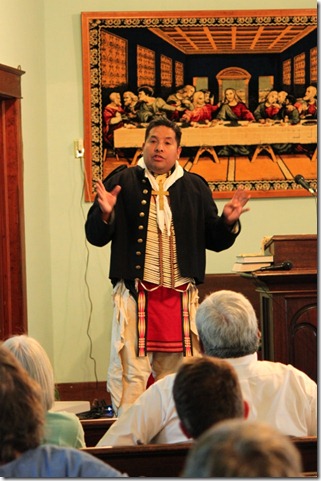 the "loyalist" faction of pastoral Friends in Nebraska and Kansas. The Yearly Meeting, renamed Great Plains Yearly Meeting in 2001, continues to embody this character.
the "loyalist" faction of pastoral Friends in Nebraska and Kansas. The Yearly Meeting, renamed Great Plains Yearly Meeting in 2001, continues to embody this character.
Today, GPYM is a fellowship of five Monthly Meetings in Nebraska, Kansas and Oklahoma. Of the original Nebraska Yearly Meeting, only Central City (Nebraska) Monthly Meeting remains. There are two Meetings in Wichita, Kansas - one pastoral/Evangelical and another non-pastoral. The other two Meetings are Native American congregations in northern Oklahoma. With a total membership of around 600, GPYM is one of most diverse Yearly Meetings in the world. It represents cultures rural and urban, Anglo-American and Native American, theologically liberal and Evangelical.
This year, GPYM met in Hominy, Oklahoma, in the heart of the Osage Nation. We were reminded that a substantial portion of our Yearly Meeting is ethnically and culturally Native American, and we were invited to deepen our relationship with this part of our heritage as a Yearly Meeting. We played local games and learned Osage dances. We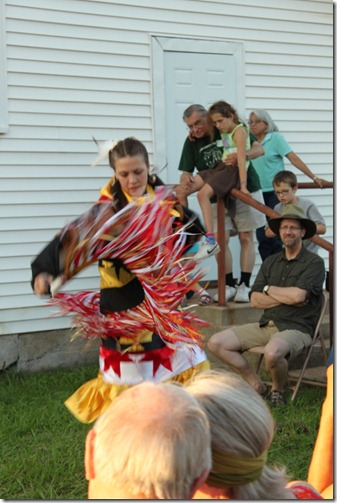 heard the stories of the Kiowa people and were blessed by a keynote address of a local Pawnee Baptist pastor, who is doing the work of sharing the gospel of Jesus Christ within the Native American context, rather than as something separate and foreign.
heard the stories of the Kiowa people and were blessed by a keynote address of a local Pawnee Baptist pastor, who is doing the work of sharing the gospel of Jesus Christ within the Native American context, rather than as something separate and foreign.
Great Plains Yearly Meeting this year gave me much to think about, especially with regards to how our Quaker Christian faith plays out in different cultural contexts. What makes us Friends? Must we adhere to the British cultural heritage of most North American Quakers, or can the gospel as understood by Friends be adapted authentically to non-British, non-Western contexts and cultures?
Thanks to the brothers and sisters at Hominy Friends Church, we are learning what it can look like for a Quaker Meeting to live fully into its non-Western cultural identity, while at the same time remaining true to the gospel of Jesus Christ's living presence and teaching power in our midst. This can only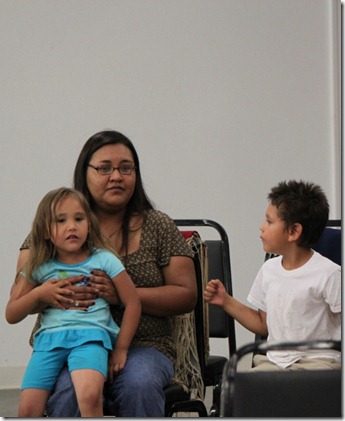 serve to strengthen Great Plains Yearly Meeting as a member of the wider Body of Christ. I pray that this might also provide an example for Friends beyond GPYM.
serve to strengthen Great Plains Yearly Meeting as a member of the wider Body of Christ. I pray that this might also provide an example for Friends beyond GPYM.
How are Friends called to emerge from our cultural heritage as a mostly British-originated religious movement? How can we open a space for women and men of all cultures and nations to receive and embody the good news that Jesus Christ has come to teach his people himself? What of our theological insights and traditions are essential, and what ideas and practices can be faithfully jettisoned or adapted in order to meet the challenges of new cultural contexts? I pray we will be open to the guidance of the Holy Spirit in all that we do. I thank God for Friends in Great Plains Yearly Meeting, who provide us with a living example of how this important work is being carried out.
 Micah Bales serves as Coordinator of Young Adult Engagement at ESR. He lives in Washington, DC with his wife, Faith Kelley. He is active with Capitol Hill Friends and is a member of Rockingham Friends Meeting, Ohio Yearly Meeting.
Micah Bales serves as Coordinator of Young Adult Engagement at ESR. He lives in Washington, DC with his wife, Faith Kelley. He is active with Capitol Hill Friends and is a member of Rockingham Friends Meeting, Ohio Yearly Meeting.
Friday, June 3, 2011
Young Adult Friends Gathering Video Series–The Epistle
By Micah Bales
This video is the ninth in a series put together from footage and interviews taken during the 2010 Young Adult Friends Gathering in Wichita, Kansas. This gathering took place over the 2010 Memorial Day Weekend and was perhaps the most diverse and balanced YAF gathering in generations. Roughly equal numbers of Liberal-Unprogrammed, Pastoral and Evangelical Friends were in attendance, along with a small number of Conservative Friends.
In this video, we hear from one of the members of the YAF 2010 Epistle Committee about the Spirit-led process of composing a statement for the gathered body of Young Adult Friends from across North America.
Make sure to check out the YAF 2010 Epistle, which is available on the Gathering’s the official website, where you can also find the advance materials that Friends were asked to use in their preparation for the conference.
 Micah Bales serves as Coordinator of Young Adult Engagement at ESR. He lives in Washington, DC with his wife, Faith Kelley. He is active with Capitol Hill Friends and is a member of Rockingham Friends Meeting, Ohio Yearly Meeting.
Micah Bales serves as Coordinator of Young Adult Engagement at ESR. He lives in Washington, DC with his wife, Faith Kelley. He is active with Capitol Hill Friends and is a member of Rockingham Friends Meeting, Ohio Yearly Meeting.






